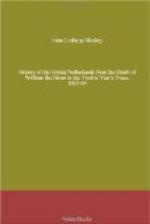Unquestionably the Dutch republic was the only portion of Europe likely to be substantially affected by these secret arrangements; for, after all, it had not been found very easy to embody the splendid visions of Henry, which had so dazzled the imagination of James in the dry clauses of a protocol.
It was also characteristic enough of the crowned conspirators, that the clause relating to the United Provinces provided that the allies would either assist them in the attainment of their independence, or—if it should be considered expedient to restore them to the domination of Spain or the empire—would take such precautions and lay down such conditions as would procure perfect tranquillity for them, and remove from the two allied kings the fear of a too absolute government by the house of Austria in those provinces.
It would be difficult to imagine a more impotent conclusion. Those Dutch rebels had not been fighting for tranquillity. The tranquillity of the rock amid raging waves—according to the device of the father of the republic—they had indeed maintained; but to exchange their turbulent and tragic existence, ever illumined by the great hope of freedom, for repose under one despot guaranteed to them by two others, was certainly not their aim. They lacked the breadth of vision enjoyed by the regenerators who sat upon mountain-tops.
They were fain to toil on in their own way. Perhaps, however, the future might show as large results from their work as from the schemes of those who were to begin the humiliation of the Austrian house by converting its ancient rebels into tranquil subjects.
The Marquis of Rosny, having distributed 60,000 crowns among the leading politicians and distinguished personages at the English court, with ample promises of future largess if they remained true to his master, took an affectionate farewell of King James, and returned with his noble two hundred to recount his triumphs to the impatient Henry. The treaty was soon afterwards duly signed and ratified by the high contracting parties. It was, however, for future history to register its results on the fate of pope, emperor, kings, potentates, and commonwealths, and to show the changes it would work in the geography, religion, and polity of the world.




